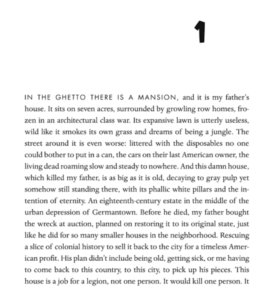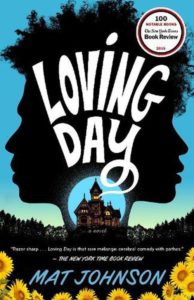Growing up in a bad part of town
I was watching Chris Rock on Inside the Actors Studio. He talked about how growing up in dangerous neighborhoods in Brooklyn helped form him.
Personally, I highly value the self-made-ness of a self-made man or woman. I think most people do, especially compared to someone born with a silver spoon in their mouth. His description of his childhood in a bad neighborhood reminded me of a neighborhood I spent some time growing up in. I started writing this post about my self-made-ness, but realized it’s more about my mother’s.
I looked up the name of a street my mom moved to not long after my parents divorced — Rockland Street in Philadelphia. In the 70s it was, to say the least, an economically depressed neighborhood. They gave out welfare sandwiches to kids at the end of the block, no questions asked. My mom points out we never went on welfare, but I enjoyed those free sandwiches at the time — puffy white bread, bright yellow mustard, thin slices of baloney. Stuff only a kid could love because now I would see such stuff as horribly unhealthy and a government subsidy to agribusiness disguised as help for poor people. My family would never get such unhealthy stuff, so I had to enjoy the free stuff.
Once I made the mistake of walking around the block in bare feet, leading to so much broken glass and blood on my feet it took I don’t know how long to tweeze it all out.
Anyway, back to the search. Today’s search revealed the place hasn’t changed much. Only two news articles came up on it: “2 Arrested After Double Shooting In Logan; No Arrests In Three Others” and “Police Identify Limo Driver Shot And Killed Behind The Wheel In Feltonville” although the latter story related to a different section of Rockland Street.
Besides two shootings, the search also revealed a neighborhood blog, RocklandStreet.com — an encouraging, community-building site, though its top story covered a colossal (6ft x 8t x 10ft!!) pothole no one had fixed for at least four months.
Sigh.
Anyway, as I mentioned, this post is ending up about my mom. As a kid, I didn’t think much of where we lived. I had no other childhood than the one I was living to compare it to. Kids bolted a milk crate and piece of plywood to a telephone pole to make a basket to play hoops at the downhill end. People in run down houses spent a lot of money on cars for some reason. People opened fire hydrants to play in on hot summer days. Neighbors had giant tubs of welfare peanut butter that was sweetened as much as peanut butter cups candy.
All that was normal to us. I mean, my father’s house was nearby but in a neighborhood I don’t think has ever been economically depressed and my two sisters and I spent equal time at each house.
I don’t think many adults who knew otherwise would choose living on Rockland Street if they had a choice. So many cockroaches. So much crime.
So why did we live there? I’ve never asked my mom, but I remember two things. The first is that she said when my parents decided to divorce she wanted to avoid a long, drawn-out process, which probably meant getting less, materially speaking. I never followed up to find out more or asked my father’s perspective. I was only around four years old so I wasn’t aware. And who knows how accurate my memories are?
The second is that I never remember my mother complain about the situation. I remember her working a lot to earn money, fixing the place up with my stepfather, and moving to a nicer house and neighborhood a few years later. I tend to think of my time their as building character, but I can’t take credit for improving our situation. That took hard work by adults.
Anyway, the themes of not blaming others but taking responsibility for improving situations and looking for solutions instead of dwelling on problems runs through my posts. Rockland Street has been a major instance of each for me.
EDIT: Since writing this post, Mat Johnson wrote a novel, Loving Day. He’s my age and grew up near me. The opening sentence of the book: “In the ghetto there is a mansion, and it is my father’s house . . . in the middle of the urban depression of Germantown” which he also described as “the heart of black Philly.” I also posted about The five times I got mugged growing up, which I thought was normal, and didn’t realize until so many people talked about how white people don’t know what poor black neighborhoods are like.
Only late in life did I realize most white people don’t know what it’s like to live as a racial minority victimized by the majority for my skin color and sex. For me, it’s normal to be targeted for violence for being a boy with white skin. It’s the only childhood I had.
Here’s page one of the book:

NPR describes Johnson: “As a biracial child growing up in Philadelphia, writer Mat Johnson identified as black—but looked white.” He talks about blackness, whiteness, and mixed-race-ness, plus describes the neighborhood and people in it with all manner of racial epithet and mainstream culture celebrates him for it. The Washington Post: “At various points in the novel, the students at [the mixed-race school] Mélange are referred to as zebras, Oreos, mulattoes, Uncle Toms, mutts, sunflowers, half-breeds and mongrels.” The New York Times quotes him describing the school as: “‘Mixed Mews,’ ‘Halfie Heights’ and ‘Little Halfrica'”. What would happen if I used such terms outside quotes from the liberal media?
Here’s the book cover:

On NPR he described a similar part of his childhood similarly to mine:
I think my parents probably separated when I was about 4, and they divorced later, but I stayed with my mother. It was the ’70s. We didn’t have, you know, the same sort of co-parenting situations a lot of people have now. So it was every other weekends for a while, and then when I could get to my dad’s on my own, every other weekends and Wednesdays. So mostly I was with my mom, and mostly I was in Germantown and also Mount Airy in majority-black environments.
except that my sisters and I split our time fifty-fifty between parents, but both in Germantown and Mount Airy.
He continued,
it wasn’t until—because I was in Philly, I wasn’t in, like, real hard-core majority-white environments until, like, college. And I remember going to visit a girlfriend at Lafayette College in upstate Pennsylvania, and there—I came into a room and there was, like, 200 people and they were all white. And I just started, like, having a panic attack.
Since my parents sent my sisters and me to a Jewish grade school, for those years I spent my days in a majority Jewish environment. I’ll leave it to you to decide if Jewish is white, but this was a generation and a half after the Holocaust, which weighed heavily in that culture. Plus, since I’m not Jewish now and looking back, except that I was coerced, I don’t see myself as ever having been Jewish, you can imagine that context wasn’t so racially, religiously, or spiritually comfortable. Though I was friends with my classmates, that environment feels oppressive in my memories, something I’ve taken years to see wasn’t my fault.
I had a similar experience when I started college, my first majority-white institution, depending how you count a Jewish day school to a child who wasn’t Jewish. I didn’t have a panic attack, but when Columbia kept describing itself as “the most diverse Ivy League school,” I kept wondering, “then where are the black students?” since there were so few compared to my childhood homes, junior high, and high schools.
Read my weekly newsletter

On initiative, leadership, the environment, and burpees
Pingback: I flipped burgers at the Burger King on the Champs-Elysees in Paris » Joshua Spodek
Pingback: Privilege? | Joshua Spodek
Pingback: How many times is it normal to be mugged? » Joshua Spodek
Pingback: My shameful reason for not learning to play basketball » Joshua Spodek
Pingback: Another reason why an amendment banning pollution will pass and change culture » Joshua Spodek
Pingback: The 160th Anniversary of the Emancipation Proclamation Is Today » Joshua Spodek
Pingback: The New Yorker profiled my living off the grid » Joshua Spodek
Pingback: My Sledding Hill, August 2023 » Joshua Spodek
Pingback: Whom would you call a minority in this picture? » Joshua Spodek
Pingback: The redlined neighborhood I grew up in » Joshua Spodek